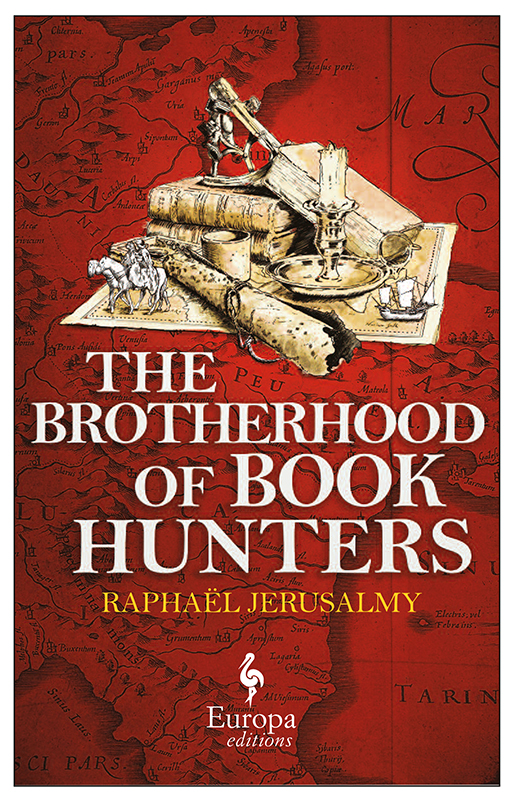
The Brotherhood of Book Hunters
کتاب های مرتبط
- اطلاعات
- نقد و بررسی
- دیدگاه کاربران
نقد و بررسی

November 17, 2014
It is 1462 and the poet François Villon sits in a filthy Parisian prison waiting to be executed. Records show that his sentence was changed to banishment, and after 1463, he disappears from all record. Jeruslamy (Saving Mozart) picks up at this point and spins a wild story that has Villon being pardonded by King Louis XI in exchange for some favors that could very well bring the Papacy to its knees. His first mission is to convince a bookseller to print and disseminate some banned works for the French diocese in order to tilt public favor against the Vatican. The deal is not as straightforward as it seems, however, and in order to complete his mission, he must travel to Jerusalem, "a city not so much built of stone and bricks as fashioned out of words and dreams." So begins his great voyage across the sea and into the Holy Land, where he and his traveling companion, Colin, are introduced to Christian monks, rabbis, and a mysterious group of rebels called the Brotherhood of Book Hunters. François's mission becomes more convoluted than ever, and although the plot is cinematic and full of twists, the novel trips over its erratic prose, which can be hackneyed and difficult to follow. This is an ambitious second novel that never quite lives up to its potential.

Starred review from October 1, 2014
Reaching back to the tumultuous 15th century, Jerusalmy chronicles a fictional tale of real-life brigand/poet Francois Villon, dispatched to find The Brotherhood of Book Hunters. Jerusalmy's dense and erudite narrative begins in Paris. Villon has been imprisoned for his writings, but Louis XI and Guillaume Chartier, bishop of Paris, are scheming to break Rome's hold over France. The pair want Villon to lure Johann Fust, a Gutenberg ally, to Paris to establish a printing concern to make his books more available. The king's plot later expands. He forces Villon and Colin de Cayeux, another Coquillard bandit, to journey to Jerusalem, "homeland of prophets and psalmists, peasants and fallen angels." They're to find the shadowy Brotherhood, an eclectic collection of Jews, revisionist Christians and others intent on preserving the world's knowledge, and secure books to supply the Paris printing presses. As the hardy pair trek "from Rue St. Jacques to Genoa, from Acre to the monastery in Galilee and to Safed," characters abound: the fashionable fop and de' Medici agent Federico Castaldi; archivist Brother Medard, a cranky, combative dwarf; and young Rabbi Gamliel ben Sira, gaon of Safed, who speaks for the Brotherhood's secret leader. In the library, located deep underground in "Invisible Jerusalem," Villon learns the Brotherhood's collection includes the "overwhelming testament dictated by Jesus to the high priest Annas just before his arrest," a document critical to the Papacy and freethinkers alike. In deft translation, the novel sparkles with fanciful descriptions-"He would throw a judicious quotation at an eminent rival as you throw a knife at a straw target"-and Machiavellian machinations, highlighted by scholarly but accessible ruminations on Aristotle and Plato, religion and humanism, which are symbolically relevant to the forces gathering to bring on Reformation and Enlightenment, "to free the word from those who had been keeping it hostage in their chapels and cellars for centuries." Literate. Brilliant. Entertaining.
COPYRIGHT(2014) Kirkus Reviews, ALL RIGHTS RESERVED.

December 1, 2014
Condemned to death, Francois Villon, the great (and rascally) poet of the French Middle Ages escapes execution when he agrees to a scheme proposed by Guillaume Chartier, bishop of Paris, and Louis XI himself. In a move meant to challenge Rome, he must persuade freethinking German printer Johann Fust to resettle in Paris. Soon, Villon's mission expands to the Holy Land (French-born Jerusalmy, author of Saving Mozart, sells antique books in Tel-Aviv). The result is a fabulously entertaining picaresque and a great portrait of Villon.
Copyright 2014 Library Journal, LLC Used with permission.

























دیدگاه کاربران